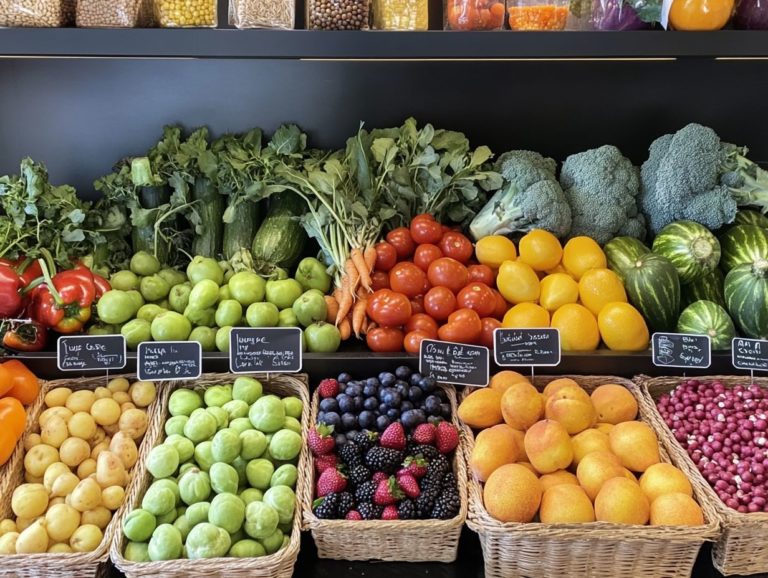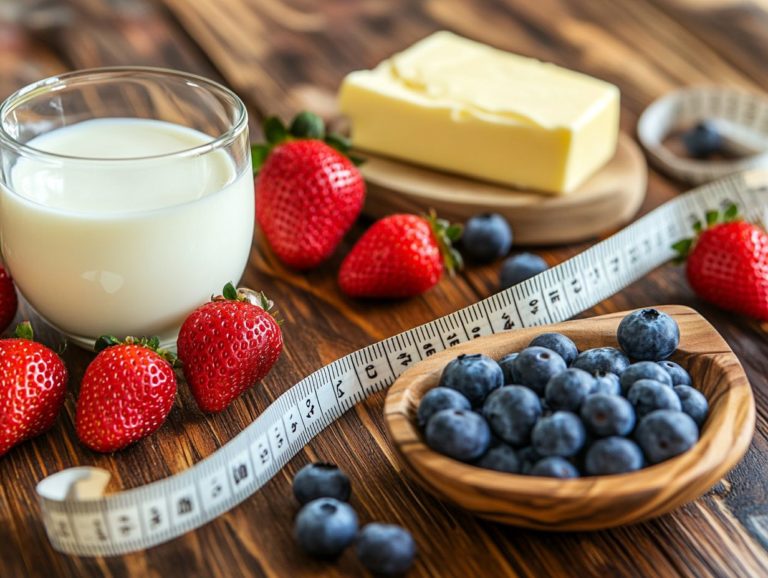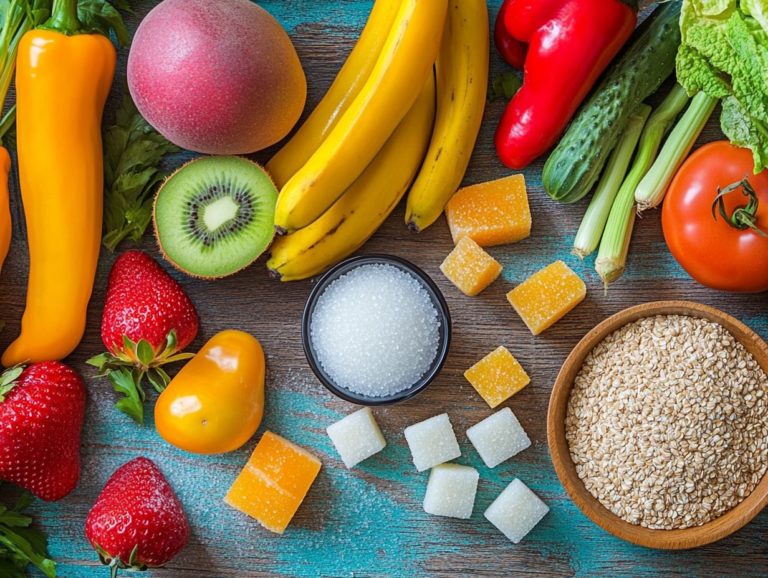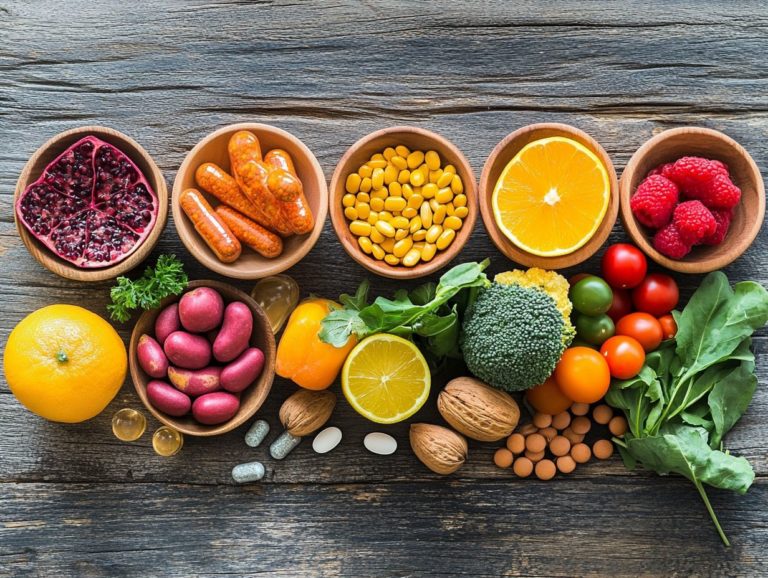5 Superfoods to Boost Your Holistic Diet
In today’s fast-paced world, nurturing your body holistically has never been more crucial. This article delves into five powerhouse superfoods avocado, blueberries, kale, quinoa, and chia seeds that can elevate your holistic diet and enhance your overall well-being.
Alongside these nutritional stars, it explores what a holistic diet truly entails, highlighting its key components and how incorporating these superfoods can provide additional benefits.
Practical tips for seamlessly integrating them into your meals are also shared, along with a discussion on any potential risks.
Start your path to better health through mindful eating, and discover how these choices can transform your life.
Contents
- Key Takeaways:
- 1. Avocado
- 2. Blueberries
- 3. Kale
- Why You Should Try Quinoa Today!
- Chia Seeds: Small but Mighty!
- What Is a Holistic Diet and Why Is It Important?
- Frequently Asked Questions
- What are 5 superfoods to boost your healthy eating?
- Why are these superfoods considered beneficial for a holistic diet?
- How can avocado benefit a holistic diet?
- In what ways can kale contribute to a holistic diet?
- What makes blueberries a superfood for holistic eating?
- How can quinoa and chia seeds enhance a holistic diet?
Key Takeaways:
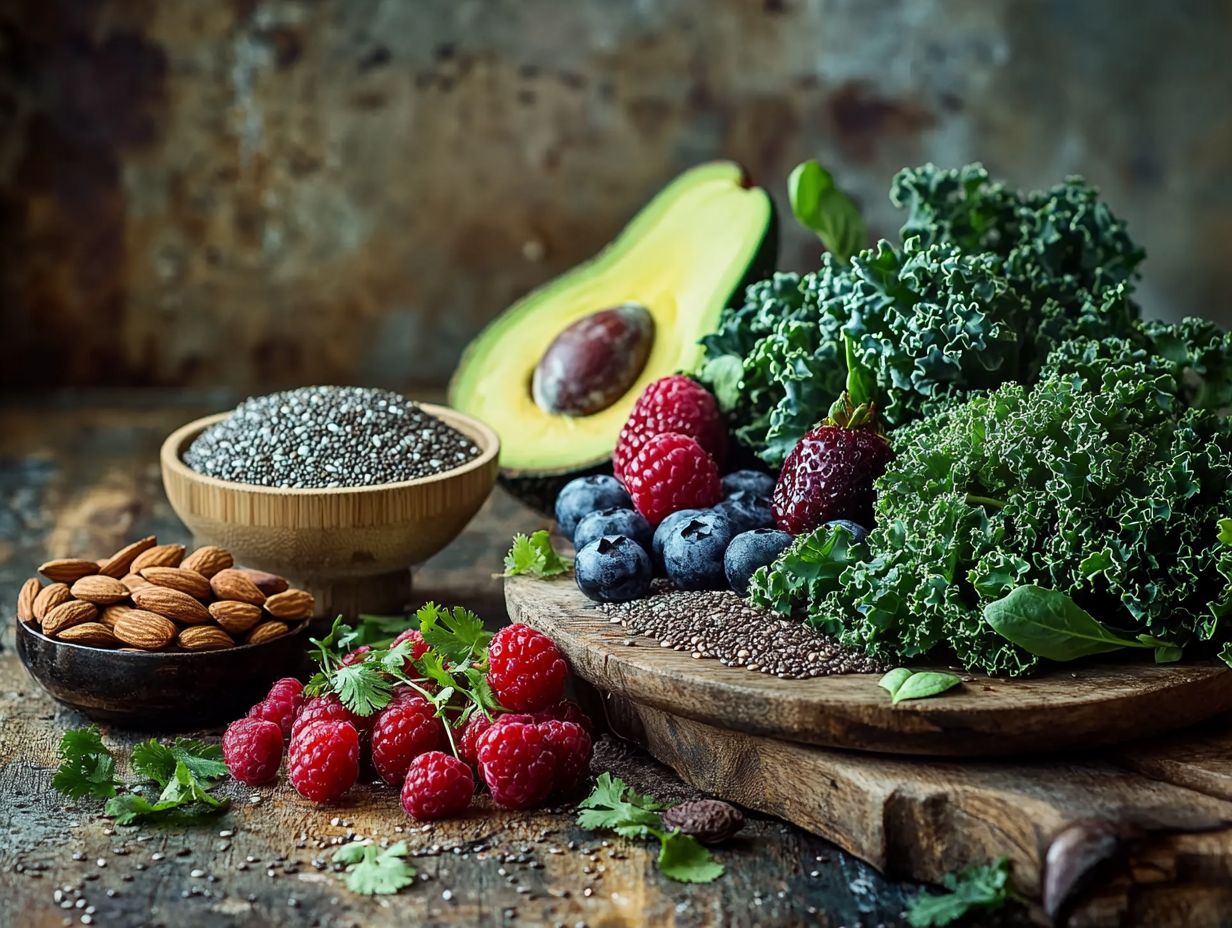
Avocado, blueberries, kale, quinoa, and chia seeds are five superfoods that can be easily incorporated into a holistic diet. A holistic diet focuses on nourishing the body and mind through whole, natural foods. Including these superfoods, along with others listed in the top 10 nutrient-dense foods for holistic health, offers essential nutrients and health benefits, helping to boost energy, improve digestion, support immunity, and promote overall well-being.
1. Avocado
Avocado is packed with nutrients and provides impressive health benefits that you d be wise to incorporate into your diet. With high levels of fiber and omega-3 fatty acids, it’s no wonder this creamy delight is favored by nutrition enthusiasts and registered dietitians for promoting heart health and overall wellness.
This fruit is also packed with essential vitamins. Vitamin K is vital for bone health, while vitamin E provides important antioxidants. You also benefit from B vitamins, particularly folate and B6, which support cognitive function and enhance brain health. Let s not overlook potassium, which helps regulate blood pressure and supports cardiovascular health.
When you combine these nutrients, you re not just supporting your body; you re fortifying your immune system, ensuring that it s well-equipped to fend off illnesses and promoting overall vitality.
2. Blueberries
Blueberries are celebrated for their remarkable antioxidant properties and outstanding health benefits, positioning them as an exemplary superfood brimming with natural compounds found in plants that may help prevent diseases.
These vibrant berries are particularly abundant in flavonoids, including anthocyanins, which give them their striking blue color. Research indicates that these compounds are instrumental in reducing inflammation and oxidative stress two critical factors in chronic conditions such as heart disease and certain cancers.
A study published in the Journal of Agricultural and Food Chemistry suggests that regularly indulging in blueberries could enhance heart health by promoting better blood pressure regulation.
Experts say the antioxidant benefits of blueberries support brain health, potentially decreasing the risk of cognitive decline as you age. Adding blueberries to your diet is not merely a tasty choice but also a wise strategy for long-term well-being.
3. Kale
Kale truly stands out as a superfood in the realm of nutrition, boasting a rich concentration of vitamins, minerals, and essential nutrients that can play a significant role in disease prevention and overall health.
This leafy green is particularly abundant in vitamin K, which is crucial for blood clotting and maintaining optimal bone health. Its high vitamin C content acts as a powerful antioxidant, strengthening your immune system and enhancing skin health by promoting collagen production.
Kale also delivers a wealth of minerals like calcium and potassium, both vital for supporting heart health by regulating blood pressure and ensuring proper cardiovascular function.
By incorporating this vibrant vegetable into your diet, you not only gain essential nutrients but also fortify your body against various health issues.
Why You Should Try Quinoa Today!
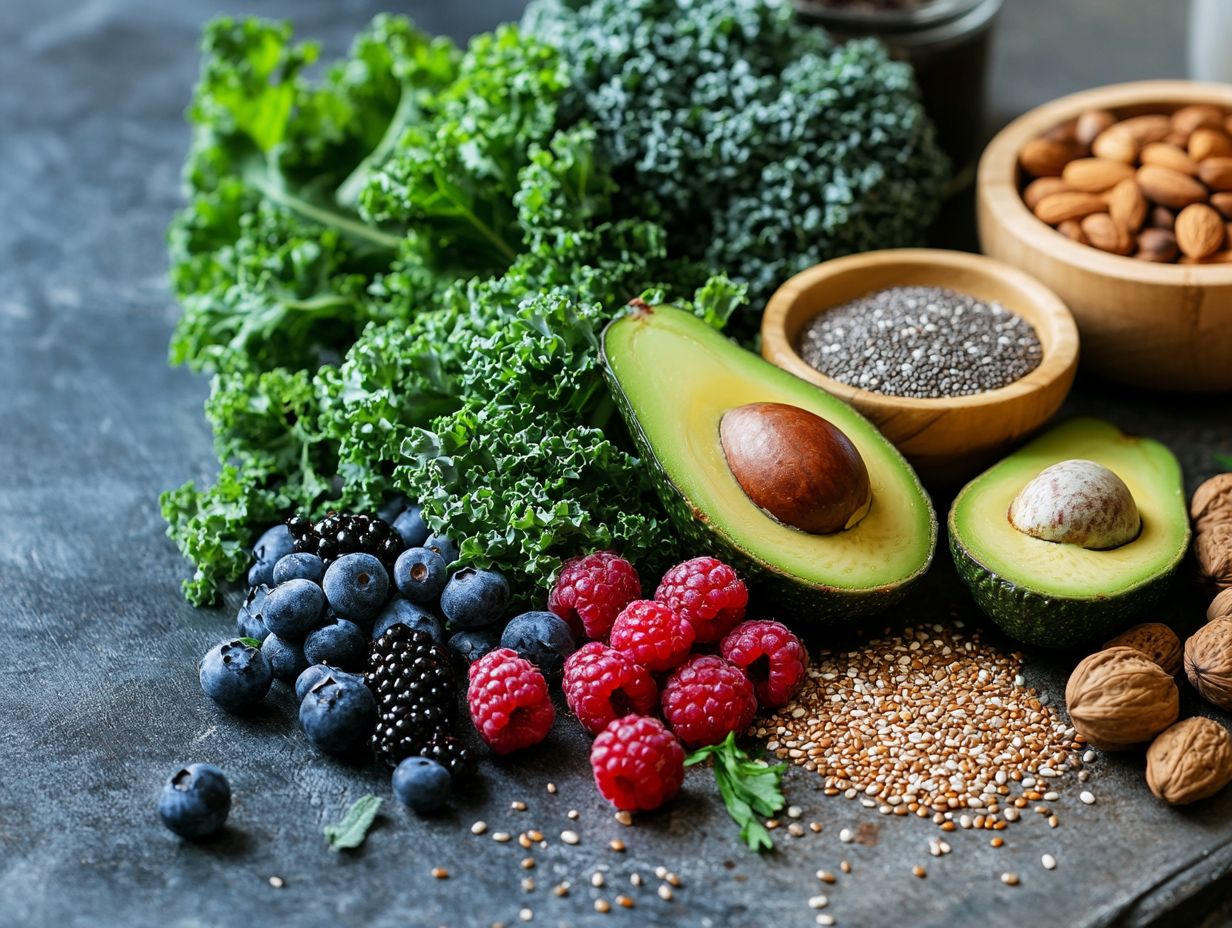
Quinoa is a superfood you should try. It s packed with protein, fiber, and folate. This remarkable grain supports heart health and overall well-being.
Quinoa also has a well-rounded amino acid profile for muscle repair and growth. It provides essential nutrients that nourish your brain and may help prevent chronic diseases like diabetes and heart disease.
The beauty of quinoa lies in its adaptability. You can easily add it to a variety of meals. Whether you enjoy it in salads, stir it into soups, or serve it with roasted vegetables, quinoa enhances the nutritional value of any dish.
Chia Seeds: Small but Mighty!
Chia seeds are full of healthy fats and fiber that support your heart and digestion. They are known for their many health benefits, including promoting heart health and aiding digestion.
These tiny seeds absorb liquid and form a gel-like consistency. This helps you feel full and supports healthy bowel movements, improving your digestive health. Their rich nutritional profile boosts your immune system with essential antioxidants.
To enjoy these benefits, consider adding chia seeds to:
- Smoothies
- Oatmeal
- Yogurt
- Your favorite baked goods
Mixing chia seeds in water or juice creates a nutrient-dense drink. Try adding this superfood to your daily routine!
What Is a Holistic Diet and Why Is It Important?
A holistic diet is your path to better nutrition, focusing on the connections between different food components. It goes beyond counting calories to embracing the benefits of superfoods for disease prevention and overall health.
This perspective encourages you to think about the quality and source of your food. It champions whole, unprocessed ingredients full of vitamins, minerals, and antioxidants, fostering a balanced relationship with what you eat.
By incorporating superfoods like quinoa, kale, and blueberries into your meals, you can boost your body s resilience. These foods not only nourish you but also help reduce inflammation and improve long-term health.
What Are the Key Components of a Holistic Diet?
The key components of a holistic diet include balancing macronutrients and micronutrients. Focus on consuming nutrient-dense foods, including superfoods rich in vitamins, minerals, and antioxidants.
These elements enhance your bodily functions and promote vitality. A holistic approach encourages incorporating whole foods unprocessed or minimally processed options that keep their natural integrity.
This style of eating often emphasizes plant-based choices, boosting your fiber intake and lowering the risk of chronic diseases. Don’t forget hydration; drinking enough water aids digestion, nutrient absorption, and detoxification.
These practices create a framework for your optimal well-being. Start incorporating these insights into your diet today!
How Can Superfoods Improve Your Healthy Eating?
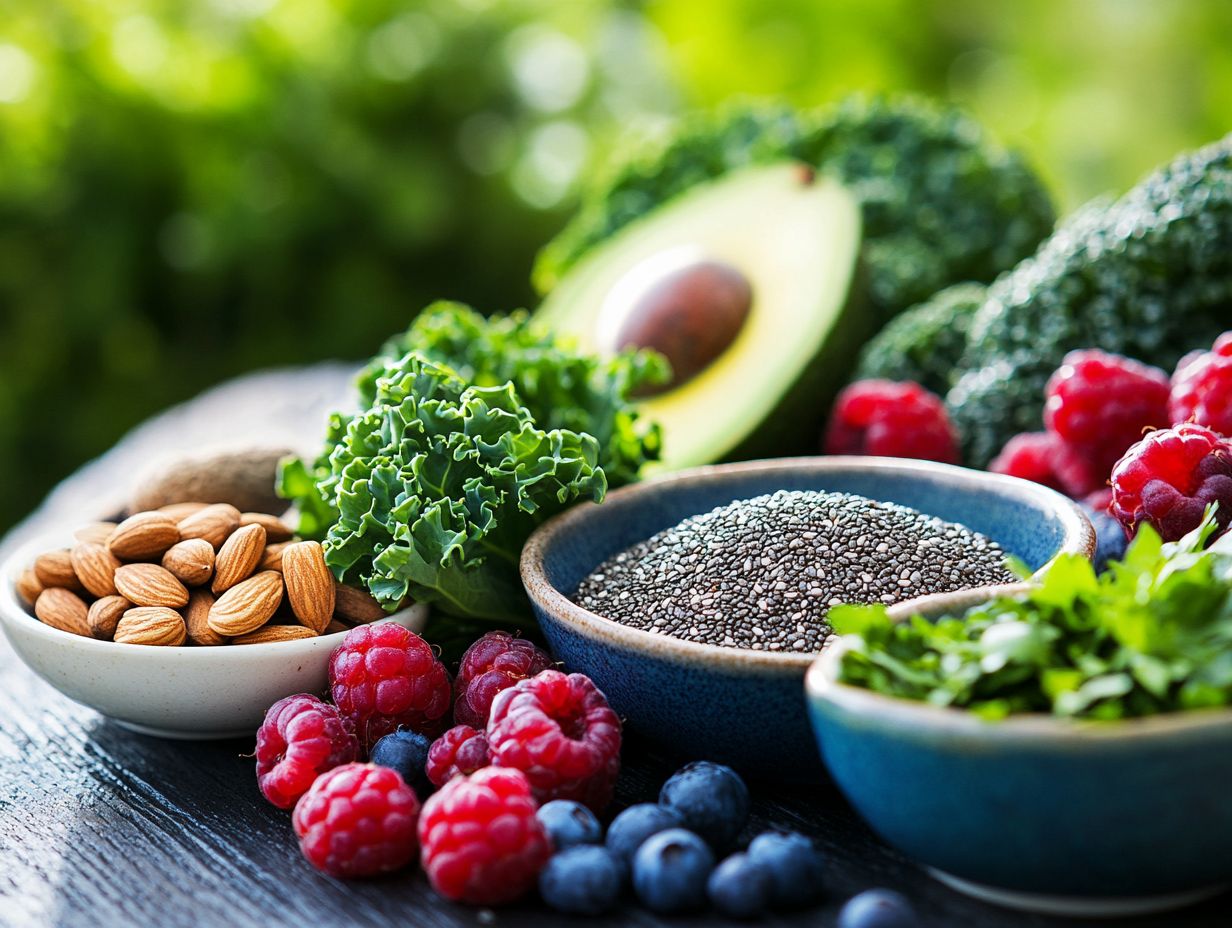
Superfoods can significantly improve your healthy eating by providing concentrated sources of health benefits. They are packed with antioxidants, which are substances that protect your cells from damage, and fiber that helps in disease prevention and boosts your immune system.
By adding a variety of these nutrient-dense foods to your meals like blueberries, chia seeds, and kale you can actively support your overall well-being.
For instance, the antioxidants in blueberries combat oxidative stress. When you pair them with the anti-inflammatory properties of turmeric, they create a powerful combination in your dishes.
Chia seeds also help digestion and keep you feeling full, making them an excellent ally for weight management, especially when combined with healthy fats like avocado.
Ultimately, blending various superfoods into your balanced meals can create a delightful mix of flavors and textures while providing synergistic health benefits that enhance your nutrition.
What Are the Other Benefits of Adding These Superfoods to Your Diet?
Incorporating superfoods into your diet not only enhances your nutrition but also brings many benefits, such as improved cognitive function, better heart health, and a stronger immune system. Research shows that the rich array of vitamins, minerals, and antioxidants in these foods plays a crucial role in maintaining your overall well-being.
Take blueberries, for example. They are known for boosting memory and cognitive function due to their high flavonoid content. Leafy greens like kale and spinach are also packed with vitamins K and A, promoting heart health while reducing inflammation.
Don t forget superfoods like quinoa and chia seeds! They provide essential amino acids and omega-3 fatty acids, which are important for optimal muscle function and heart health.
Health experts encourage incorporating these foods into your meals, highlighting their importance for personal health and their potential to lower the risk of chronic diseases.
How Can You Add These Superfoods to Your Meals?
Adding superfoods to your meals can be a fun and rewarding experience, as these nutrient-rich foods enhance both flavor and health benefits in many recipes.
Imagine blending spirulina into your morning smoothie! You could sprinkle chia seeds over your afternoon yogurt or elevate a hearty salad with quinoa the options are endless.
To make this easier, effective meal prep strategies are essential. Consider setting aside a couple of hours on the weekend to prepare large portions of your favorite dishes infused with superfoods.
For example, making a vibrant batch of overnight oats with berries and flaxseed can help you establish a nourishing breakfast routine for the week ahead. Using jars for layered salads or grain bowls aids in portion control and keeps your ingredients fresh and ready to enjoy at a moment’s notice.
Are There Any Potential Risks or Side Effects of Eating These Superfoods?
While superfoods offer many health benefits, it’s important to remember that overindulging can lead to potential risks and side effects that may affect your nutrition and well-being.
For example, while chia seeds are known for their high fiber content, consuming them in excess can cause gastrointestinal discomfort, bloating, or even kidney issues. Similarly, spirulina may trigger allergic reactions or digestive problems in some people when taken in large amounts.
Therefore, you should practice moderation when adding these nutrient-rich foods to your diet. Balancing superfoods with a variety of other foods allows for a well-rounded nutritional approach, minimizing the chances of adverse effects and promoting long-term health benefits.
Frequently Asked Questions
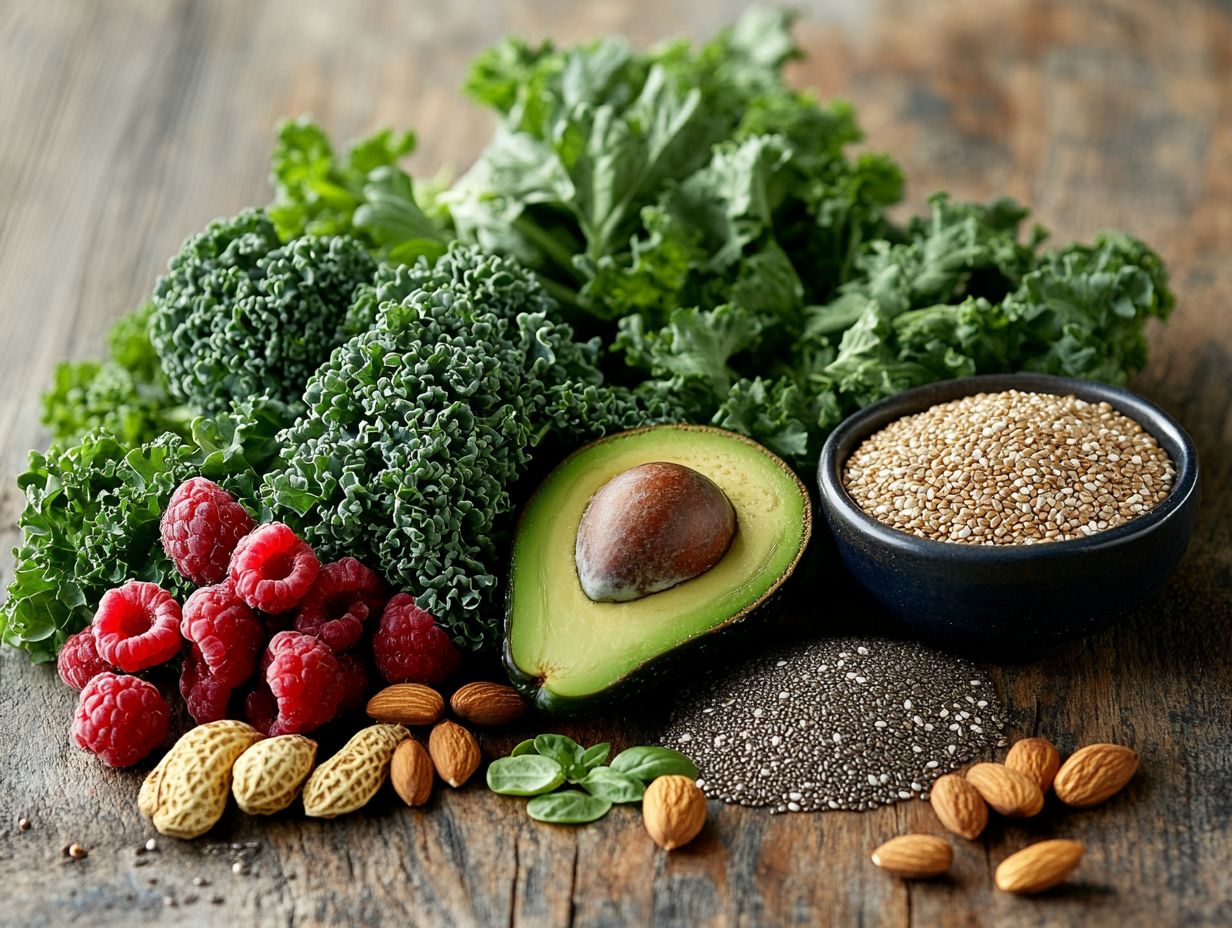
What are 5 superfoods to boost your healthy eating?
- Avocado
- Kale
- Blueberries
- Quinoa
- Chia seeds
Why are these superfoods considered beneficial for a holistic diet?
These superfoods are packed with essential nutrients and antioxidants. They support your overall health and wellness.
How can avocado benefit a holistic diet?
Avocado is full of healthy fats, fiber, and vitamins. It benefits heart health and digestion while helping your immune system.
In what ways can kale contribute to a holistic diet?
Kale is rich in vitamins A, C, and K, along with minerals like calcium and iron. Its antioxidants help detoxify your body and boost your energy.
What makes blueberries a superfood for holistic eating?
Blueberries are high in antioxidants called anthocyanins. These compounds improve brain function and heart health while keeping inflammation at bay.
How can quinoa and chia seeds enhance a holistic diet?
Quinoa and chia seeds are excellent sources of protein and fiber. They support gut health and regulate blood sugar, giving you clean energy.

